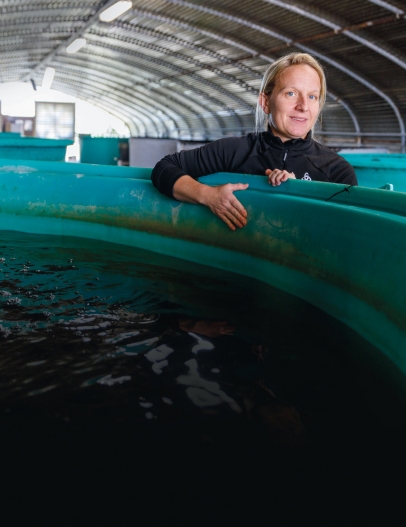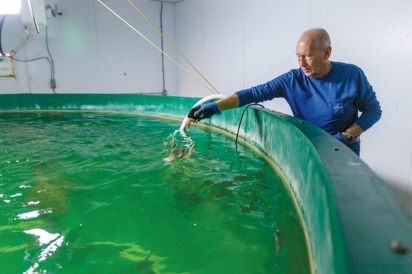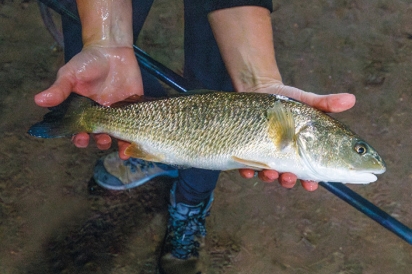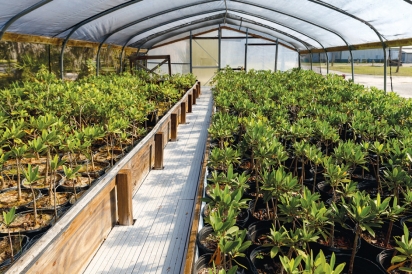Aquawoman
Move over, Jason Momoa and Aquaman, because the real sea superhero is none other than Megan Sorby. Teaming up with Mote Marine Laboratory at Mote’s Aquaculture Research Park—a groundbreaking facility set on land in Myakka gifted to Mote for this purpose—Sorby is set to make waves as the CEO of Pine Island Redfish, raising red drum fish using recirculating aquaculture system.
Forget the trident-wielding fictional hero; Sorby’s hands-on dedication to sustainability and marine conservation is what’s truly redefining the aquatic narrative. This partnership signals a leap forward in responsible aquaculture practices, and Megan Sorby is one of the unsung heroes we need to celebrate, recognizing that the real power lies in the hands of those committed to shaping a more sustainable future for our oceans.
At Edible Sarasota we’ve been talking about sustainability and aquaculture for many years with many of our favorite chefs, restaurateurs, entrepreneurs, and scientists. Steve Phelps of Indigenous, Ed Chiles of Chiles Hospitality, and Robin Pearl of Sun Shrimp have all been featured in the magazine and are all dedicated warriors in the fight to save our seas.
Dive into the aquatic world where innovation meets sustainability—that’s the heart of aquaculture, a term that’s making waves in our quest for responsible food production. Forget what you thought you knew about traditional fishing; aquaculture is the game-changer we’ve been waiting for. In a nutshell, it’s the art of cultivating aquatic life under controlled conditions, from fish farms to seaweed gardens. This isn’t just about feeding the masses; it’s a dynamic dance between science and nature, creating a ripple effect that’s reshaping our approach to seafood and environmental stewardship.
At its core, aquaculture is our golden ticket to a more sustainable and secure food future. With our oceans facing increasing threats from overfishing and environmental changes, relying solely on traditional fisheries is no longer a sustainable option. Aquaculture steps in as a superhero, providing a controlled and eco-friendly means of meeting the escalating global demand for seafood. It’s not just about putting fish on our plates; it’s a strategic move that eases pressure on wild populations, preserves marine ecosystems, and empowers us to nourish a growing population without sacrificing the health of our oceans. As we navigate the delicate balance between culinary delight and environmental responsibility, aquaculture emerges as a beacon of hope, charting a course toward a more resilient and bountiful future for both our plates and our planet.
Pine Island Redfish has been named a winner in the 2023 Seafood Industry Climate Awards (SICA) presented by Acme Smoked Fish Foundation (based in New York). This prestigious recognition endorses the viability and value of Sorby’s venture, and the fact that Pine Island Redfish is partnered with the Mote marine research facility fills us with pride for our local superheroes and their continued efforts in the face of daunting environmental challenges.
This is a full-circle career move for Sorby, who interned at Mote Marine Laboratory during her college years after deciding in second grade that she wanted to be a marine biologist. She signed up for an experiential day through her school and ended up cleaning the poop bags—essentially “mucking out the fish stalls”—and she fell for them hook, line, and sinker (pun definitely intended).
As we navigate the intricate waters of seafood consumption, it’s crucial to debunk the misinformation swirling around fish farming perpetuated by some staunch advocates of wild-caught fish. Sorby stands firm in her belief that both wild-caught and farmed fish play indispensable roles in maintaining the delicate balance of our marine ecosystems. In a world where misconceptions often overshadow the merits of responsible fish farming, Sorby offers a refreshing perspective. To those who dismiss farmed fish as an inferior product she asserts, “You can rest assured that the environmental restrictions in this country are robust,” emphasizing the stringent measures in place to ensure that aquaculture practices align with ecological integrity (and we’re here to tell you that they taste delicious).
As we look toward a future where the coexistence of wild and farmed fish is essential for preserving our oceans, Megan Sorby and her colleagues at the Mote research facility and her peers in the industry serve as guiding beacons, reminding us that informed choices can contribute to sustaining the aquatic world for our own sustenance and admiration for generations to come.







